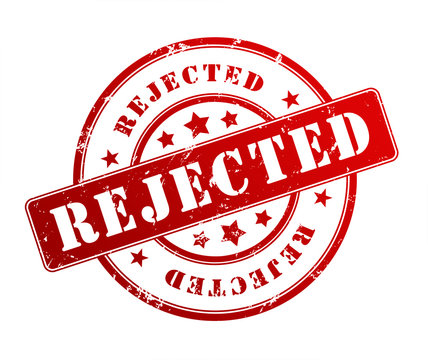We’ve all faced some form of rejection at one point or another- it is a natural part of life. A teenager who has few or no friends may feel rejected by peers. An individual who was given up for adoption may also experience feelings of rejection. A child who is emotionally neglected by their parents may feel rejected. An employee may experience rejection after being turned down for a desired position at work. We may experience rejection from our family of origin, a friend, a romantic partner, a potential romantic partner, a potential employer, an employer (when you lose your job or get passed up for a promotion), colleagues, group members, church ministry and even ourselves (self-rejection).
Any rejection can be extremely painful and hurtful. Some instances of rejection may be more impactful than others; at the same time, some forms of rejection may be more difficult to cope with than others. Without a doubt, rejection can be painful, daunting, disheartening, challenging, frustrating, tough, excruciating, distressing, unpleasant, agonizing, unbearable…name it! Researchers have suggested that social rejection activates the same brain pathways as when we experience physical pain.
So, why does rejection hurt so much?
Well…the Greek Stoic philosopher Epictetus said “Men are disturbed not by things, but by the views which they take of them” He also said “It’s not what happens to you, but how you react to it that matters”. In other words, rejection hurts so much because of your own perceptions, interpretations, beliefs or conceptions. Let me make it simpler by taking the following example…actually, it’s as easy as ABC…
The ABC Model of Cognitive-behavior Therapy (CBT)
A- Activating event. An event, occurrence or situation that happens in our environment
B- Belief. The beliefs or thoughts that you have about the event- can be rational or irrational.
C-Consequence. The emotional and behavioral consequence or reaction of the individual -can be either healthy or unhealthy.
So, A (the activating event) does not cause C (the emotional reaction). Rather, B (your belief about A), largely creates C, the emotional consequence. Actually, so much of the hurt and struggle you may be going through isn’t even based on the rejection itself but on what you tell yourself about the experience, the maladaptive ways you put yourself down or flood yourself with hopeless thoughts about the past, present and/or future. Essentially, how you react to rejection is often more significant than the rejection itself. This is why learning how to deal with rejection is so important.
While environmental factors can undoubtedly affect our lives (and we may not be able to change them) we do have some control over how we react and respond to those factors. As Charles R. Swindoll put it, “Life is 10% what happens to you and 90% how you react to it.”
So, now that you know why rejection hurts so much, what can you do about it?
After A, B, and C comes D and E.
D- Disputing. This is changing your irrational beliefs. This involves being able to discriminate irrational (self-defeating) beliefs from rational (self-helping) beliefs. Once you can detect your specific irrational beliefs, you debate them by logically and practically questioning them.
E- Effective new beliefs. A new and effective belief system consists of replacing unhealthy irrational thoughts with healthy rational ones. The word of God tells us, “Don’t copy the behavior and customs of this world, but let God transform you into a new person by changing the way you think. Then you will learn to know God’s will for you, which is good and pleasing and perfect.” Romans 12:2 (NLT)
This change is possible with persistent and consistent effort that comes from within. “For who knows a person’s thoughts except the spirit of that person, which is in him?” 1 Corinthians 2:11 (ESV). A change in your mindset, however little, will help you to improve your life. For this process to be effective, it is important to continually and constantly work on recognizing your irrational beliefs, disputing them and changing them to rational beliefs. It is a process that takes time, commitment and most of all intentionality. It is important to “commit your work <this process> to the Lord, and your plans will be established.” Proverbs 16:3 (ESV)
Thankfully, for us believers in Jesus Christ, we have the Holy Spirit guiding us as we go through this change process. Scripture says, “But when He, the Spirit of truth, comes, He will guide you into all the truth. He will not speak on His own, He will speak only what He hears, and He will tell you what is yet to come”. .John 16:13 (NIV)
Audrey is a counselling and wellness psychologist and training expert with a passion for helping individuals and organisations attain their highest emotional and psychological health levels.
As the lead consultant at Halisi Counseling & Wellness Services, her consultancy portfolio spans a wide spectrum of sectors and includes services such as psychospiritual counselling, adolescent psychological counseling, trauma counseling, self-awareness and development and training and facilitation sessions for groups and organisations.
Facebook Halisi Counseling and Wellness Services
Instagram Halisi Counseling Services
LinkedIn Audrey M. Hongo
Email audreyhongo@gmail.com

This is so educative. So I may be suffering from a long gone rejection! Phew!
LikeLiked by 1 person
Thanks Evans. I’m glad it was helpful
LikeLike
Great piece, very clear and easy to understand.
LikeLiked by 1 person
Thanks so much Jared
LikeLike